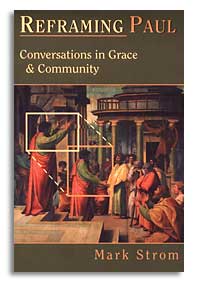Apr
8
2009
The Eternal Son came to earth and lived the Christian life . . . visibly. But pause for a moment. The Eternal Son is the second member of the Godhead (the Father, the Son, the Holy Spirit). Did it ever occur to you that your Lord . . . the Lord Jesus Christ . . . stated publicly that he could not live the Christian life? Of himself, he could not live the Christian life (John 5:30). Isn’t that amazing! (So, if you’re having a hard time, just consider John 5:30.) Now let us inquire of him, “How did you live the Christian life?”
Was the mainstay of his Christian life prayer and Bible study? He did pray, but was prayer the central pillar of his secret to living the Christian life? That just does not seem to fit, does it? The Son depending on prayer and Bible study to make it through the day?
Continue reading
2 comments | tags: Devotion, Gene Edwards, Grace | posted in Christian Life, Quotes
Apr
8
2009
When were the gospels written?
Matthew is the first of the gospels; there can be little doubt of this. The notion that Mark was first because Mark is shorter is nonsensical. Matthew was one of the disciples and was a man of letters. Who better to take notes during Jesus’ lifetime?
Moreover, immediately after Pentecost there would have been a demand for a book containing the teaching and works of Jesus.
The Jews were a people of the book. Each time God did a great work, a new part of Scripture was written to tell about it. The 3000 converts on the day of Pentecost would have expected such a book, and we can be pretty sure that Matthew set right down to write it. Doubtless he spoke with the other disciples, and perhaps Matthew’s gospel is to some extent a joint work. It is perfectly reasonable to assume that within a month after Pentecost copies of Matthew’s gospel were in circulation.
from BIBLICAL Horizons, No. 94 and 95.
Toward a Chiastic Understanding of the Gospel According to Matthew, Parts 1 & 2
© 1997 Biblical Horizons | www.biblicalhorizons.com
2 comments | tags: Bible Chronology, Bible history, Gospels, James Jordan | posted in Biblical Theology
Apr
8
2009

“…think of Simon Magus in Acts 8:9-25, who thought he could merchandise the power of the Holy Spirit. His sin was trying to use the power of God for his own ends. This is the sign of all false religion, but it is exactly this mentality that has come over so much of Christianity in our day.
Power can be an extremely destructive thing in any context, but religious power can destroy in a way that no other power can. When we are convinced that what we are doing is identical with the kingdom of God, anyone who opposes us must be wrong. When we are convinced that we always use our power to good ends, we believe we can never do wrong. And those who are accountable to no one are especially susceptible to the corrupting influence of power. In the sixth century, Saint Benedict established the ‘rule of stability’ to draw into encouraging and disciplined fellowships the many wandering prophets and monks who had no one to hold them accountable for what they said or did. Most media preachers and itinerant evangelists today suffer from exactly the same lack of accountability.
What we must see is the wrongness of those who think they are always right. Jesus Christ alone is always right. The rest of us must recognise our own foibles and frailties and seek to learn from the correction of others. If we do not, power can take us down the path of the demonic.”
Adapted from Money, Sex & Power by Richard Foster
The full article is at http://www.bullartistry.com.au/pdf_bestill/050BeStill.pdf
Comments Off | posted in Ethics
Apr
8
2009
“Recovering the Old Testament as a text in which Christians live and move and have their being is one of the most urgent tasks before the church. Reading the Reformers is good and right. Christian political activism has its place. Even at their best, however, these can only bruise the heel of a world that has abandoned God. But the Bible—the Bible is a sword to divide joints from marrow, a weapon to crush the head.”
–Peter J. Leithart, A House For My Name, p. 40.
Comments Off | tags: Old Testament, Peter Leithart | posted in Biblical Theology, Quotes
Apr
8
2009
“Progress in holiness can best be measured not by the length of time we spend in prayer, not by the number of times we go to church, not by the amount of money we contribute to God’s work, not by the range and depth of our knowledge of the Bible, but rather by the quality of our personal relationships.”
– Stephen F. Winward
Comments Off | tags: Devotion | posted in Quotes
Apr
8
2009
 “What’s gone wrong? How can the church be an attractive, relevant community of transforming grace and conversation?”
“What’s gone wrong? How can the church be an attractive, relevant community of transforming grace and conversation?”
Excerpts from Reframing Paul, by Mark Strom
“Grace is subversive. It undermines the ideals and standards of those of us who cannot tolerate weakness in others (or in ourselves). It undermines the pride of those of us who search out every vestige of unbiblical belief and practice. It undermines the presumption of those of us who preach the pure gospel to cure all ills. It undermines the safety of those of us who throw off the shackles of abusive and codependent relationships only to refuse grace to those who have hurt us. It undermines our need to find the ideal, the answer, the method, the cure. We are left with the weakness of grace-full conversation.
Grace leaves us with Jesus. Jesus leaves us with his Spirit. His Spirit draws us into conversation. The conversation opens us to the wonder and fragility of life. The Father who gave us life bids us live and converse in grace.”
Read more…
http://bullartistry.com.au/pdf_bestill/058BeStill.pdf
Comments Off | tags: Devotion, Grace, Mark Strom | posted in Ethics
Apr
8
2009

“But one of the soldiers pierced His side with a spear, and immediately blood and water came out.” – John 19:34
The spear reminds us that Jesus was a victim of both Goliath, the Gentile Sea Beast dressed in chainmail scales (Leviathan), and Saul, the Israelite King turned Land Beast (Behemoth). He was executed as a Balaamite (false prophet) by an apostate Phinehas, the corrupted High Priest who wished to retain the Covenant. The spear was thrust by the conspiracy of the serpent/dragon (Rome), and Adam and Eve (Herod and ‘Babylon’).
The 70 foot high veil in the Temple was torn in two, from top to bottom. The veil was His body (Hebrews 10:20). In Passover/the Red Sea, and in Jordan/Jericho, blood and water opened the door.
“I am the door.” – John 10:9
Comments Off | tags: Crucifixion, High Priest, Temple, Typology, Veil | posted in Biblical Theology, The Last Days
Apr
8
2009
“A revival is nothing else than a new beginning of obedience to God.”
– Charles Finney
Comments Off | tags: Obedience, Revival | posted in Quotes
Apr
8
2009
Many people felt that New Buildings was scarcely the place for a man of Chapman’s type to live in. In fact a good part of the congregation at Grosvenor Street would have found it difficult to live there in those days, for drunkenness, filth and poverty were evident in the alleys around.
One day a wealthy gentleman approached him with a most attractive proposition. A fine house, standing in its own grounds in the country… But the offer was courteously declined. “No,” said Chapman, “I must live where the poorest saint can visit me.”
One day Mr. Chapman had the pleasure of an unexpected visit from a relative, who evidently desired to know how he lived…
Continue reading
Comments Off | tags: Biography, Devotion | posted in Ethics
Apr
8
2009
“Individualism is the problem. Community is the solution.”
That’s what they are saying. First the philosophers, sociologists, political theorists, psychologists, and theologians were saying it. Now I hear pastors, church leaders, and impressionable young seminarians saying it. Individualism is what bedevils culture and church both; community is what will save them…
The Real Problem: Continue reading
Comments Off | tags: Culture | posted in Ethics




























